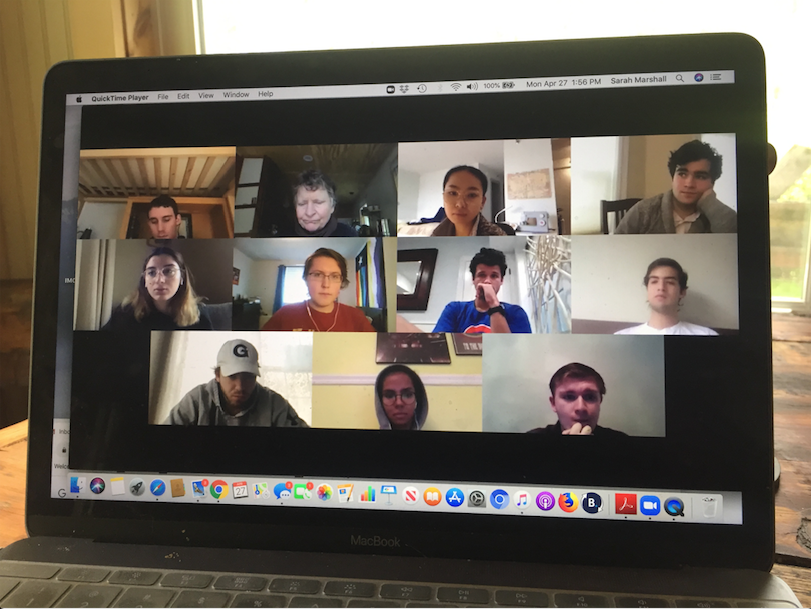GU Department of Performing Arts Creates Connections Despite Pandemic Distancing
With the sudden transition to online learning mid-March 2020 due to the COVID-19 pandemic, the Georgetown University Department of Performing Arts faced the loss of one of its core strengths — the ability to gather in person and create, whether through theater productions, live music, or dance choreography. The faculty and students’ responses were nothing less than inspirational, and below are some examples of the beautiful connections they made and the meaningful work they achieved, despite the distance.
The Rover (ReFrame)
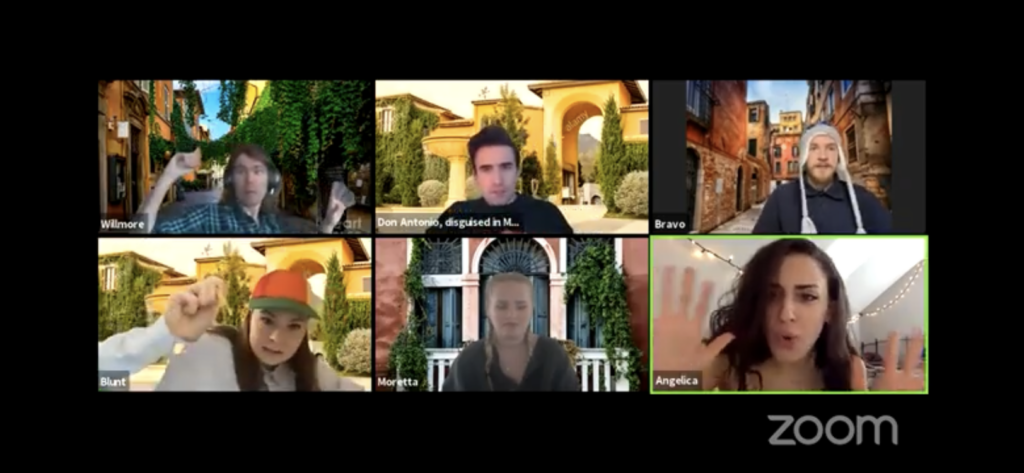
Georgetown University Theater & Performance Studies Program reimagined the closing production of its Home Season “Dreams of Crossing” due to social distancing, creating a witty and engaging online reading of what was originally scheduled to be a fully staged production at the Davis Performing Arts Center. The reading of The Rover (ReFrame), adapted and directed by Prof. Maya E. Roth, took place April 18, 2020, featuring the creative talents of Georgetown students and accompanied by deep dramaturgical work and related final projects completed for academic credit.
The festive and bold Restoration comedy The Rover, written by the first professional female playwright (also a spy!) explores gender, class and cultural crossings. S/wordplay, masquerade, and physical theater were central to the staging of the originally planned full production, set in Carnevale amid the Silk Road’s crossings and the successful reading provided a colorful glimpse of that world. Watch the livestreamed reading and learn more about the phases of the The Rover (Reframe) project, including dramaturgical info, fight choreography, Letters from Quarantine, and an eventual lobby installation.
GU Chamber Singers and Concert Choir
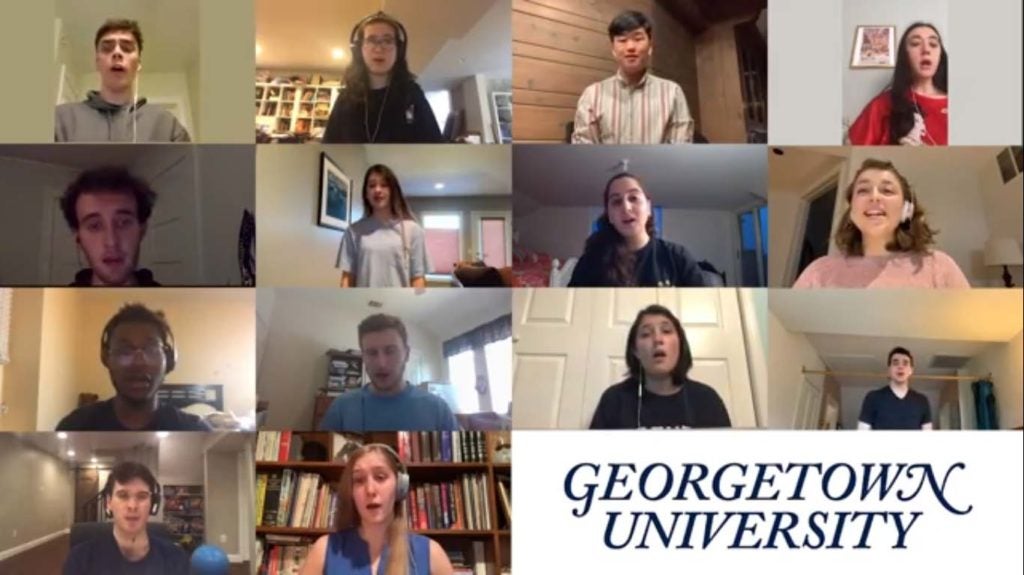
Being spread out in disparate locations across the country did not stop Prof. Frederick Binkholder, the GU Chamber Singers, and Concert Choir from making music together; they recorded themselves from afar and still appeared as an ensemble via Zoom as part of the Georgetown University Conferral of Degrees ceremony. View the videos.
Costume Shop Practicum
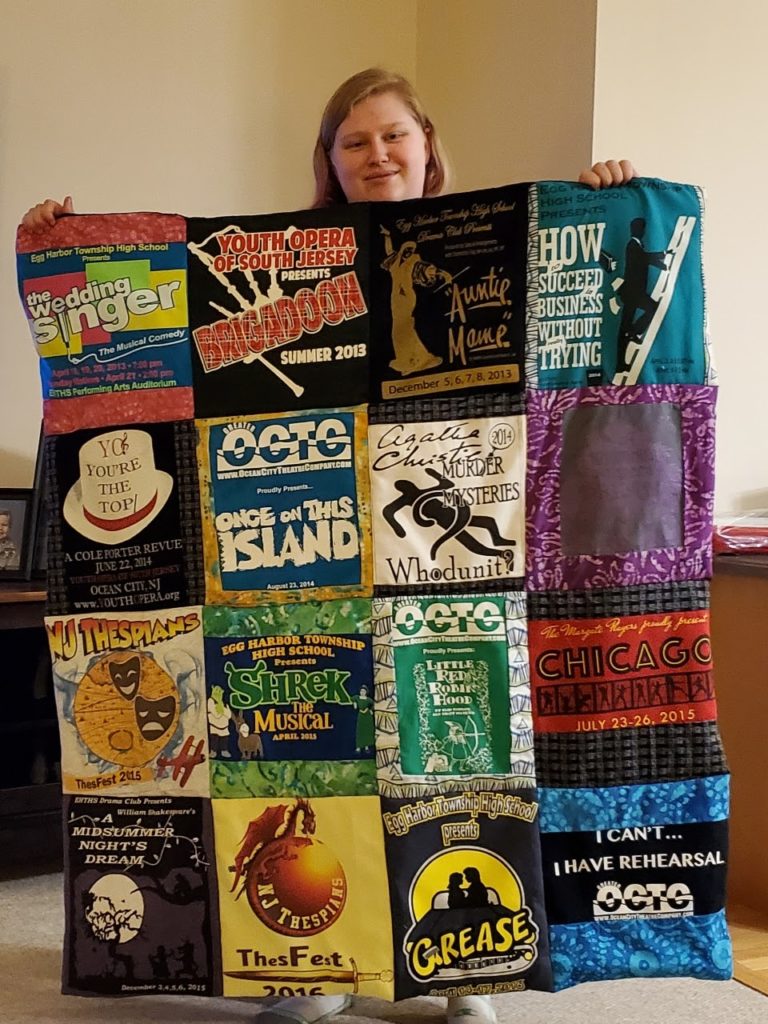
Theater & Performance Studies Program (TPST) majors and minors participate in experiential learning through practicum class in runcrew, scenic and costume areas, among others. Prof. Dorothy Barnes Driggers’ costume practicum students enrolled in TPST 094 are all responsible for completing 32.5 hours of work in the Davis Performing Arts Center’s costume shop, centering around the process of building and sourcing theatrical garments for the Theater & Performance Studies season. However when the spring 2020 course shifted mid-semester to distance learning, most of the students had only completed around half of the required hours, and Barnes Driggers switched gears, asking them to pick a final project or projects from their own closets that involved using the same skills learned and practiced in the shop, while documenting the progress from start to finish.
Learn more about the costume practicum projects.
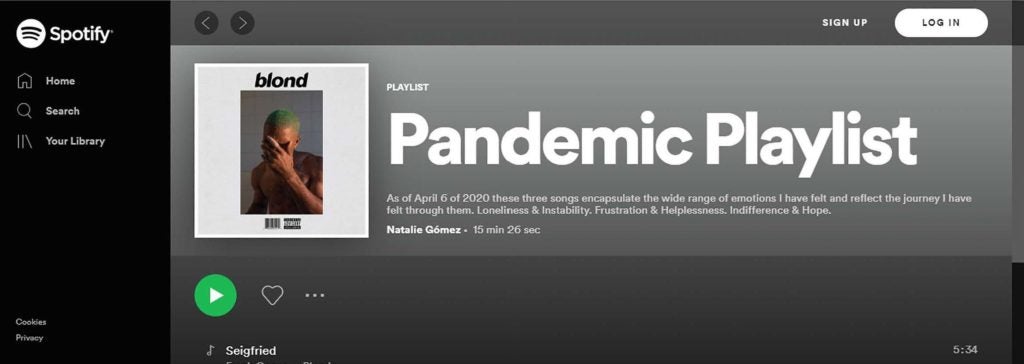
Live Music in Context Playlists
Prof. Anthony DelDonna, director of the GU Music Program, normally teaches his Live Music in Context (MUSC 200) course with, well, live music; the Friday Music Series live performances in McNeir Hall, free and open to the general public as well, serve as the launchpad for student discussion and written responses. When the series was sidelined for public safety, DelDonna prompted his students to reflect and create playlists of music specifically in response to the pandemic.
He notes that this project allowed students a vehicle to express their thoughts not only about the crisis, but also how it had an impact on their learning, and to underline challenges and successes. Some of the responses were deeply personal with seniors processing the abrupt end of their college experience.
View a collection of some of the poignant playlist projects.
Cabaret Performance Class
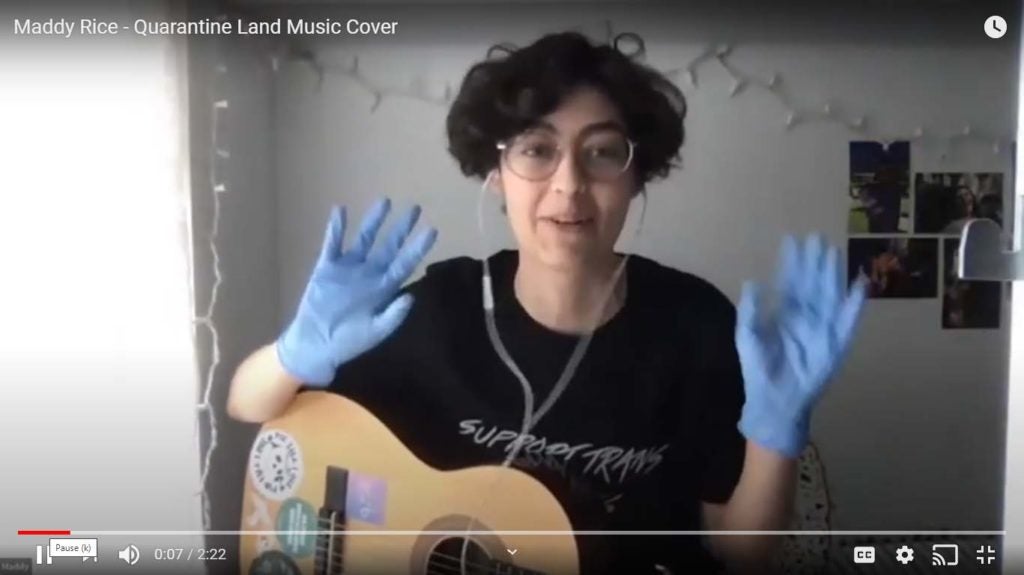
The Cabaret Performance Class (TPST 227), offered for the first time in spring 2020 and taught by Prof. Michael T. Williams, would have culminated in a night of cabaret performance staged in the Davis Performing Arts Center lobby for the Georgetown University community. Though the gathering could not happen, class members came up with creative ways to perform virtually instead, and a few directly addressed the pandemic. View some of the final cabaret projects.
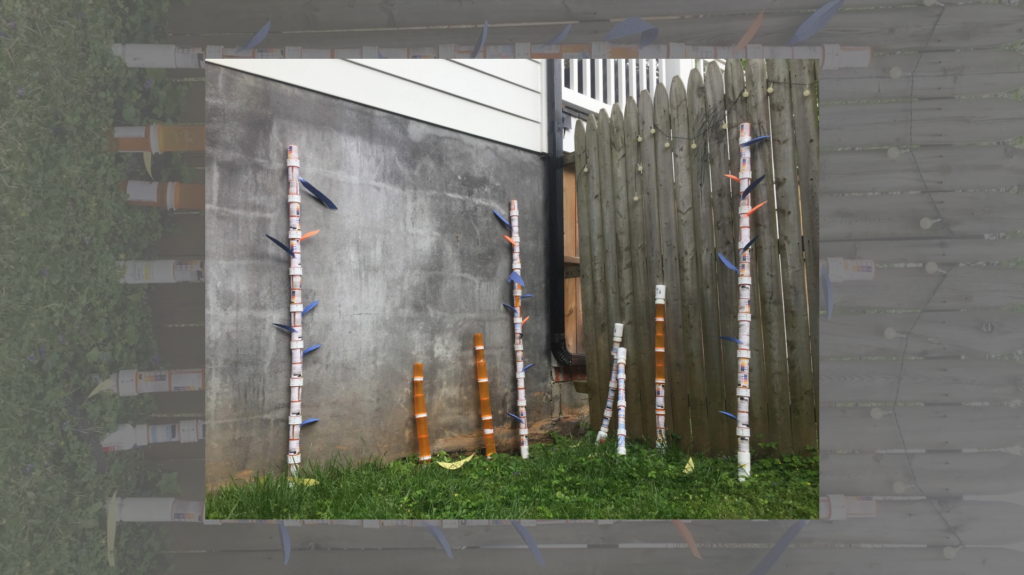
Adaptation, Performance of Literature
& Performing Madness
Students in Prof. Natsu Onoda Power’s classes TPST 200: Adaptation/Performance of Lit and TPST 291: Performing Madness responded to the challenges of online final projects in innovative and engaging ways. “Soyica Colbert, vice dean of faculty and director of arts initiatives, says Onoda Power and her students have more than risen to the occasion of rethinking one of the fundamental questions of theatre: what can we create together?….“When confronted with the challenge to teach Theater and Performance Studies online, Onoda Power did what she always does – make something new. The lessons students learn this semester will change how we think about live performance and what it means to go to the theatre.”
Read the full story on Georgetown College’s website.
In Your Shoes: A Project in Theatrical Performance and Dialogue
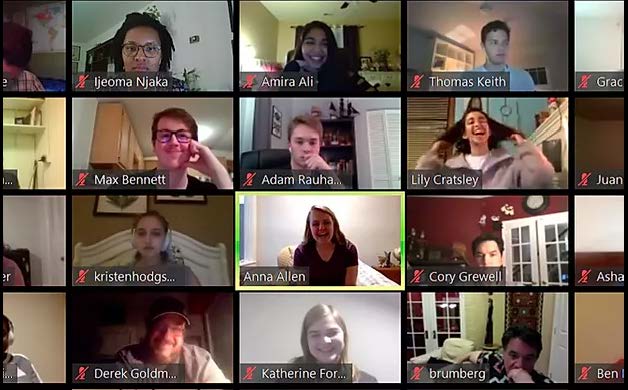
In Your Shoes, the culminating project of TPST 415: Dialogue, Difference & Performance is a collaborative project of the Laboratory for Global Performance and Politics (part of Georgetown College and the School of Foreign Service), Georgetown University’s Democracy & Governance program, and Patrick Henry College. Addressing the polarization in American society, the project’s mission is to employ techniques rooted in theatrical performance to bring students of diverse social, cultural and religious backgrounds into deep, challenging, and mutually respectful dialogue with one another to promote mutual understanding and empathy. Moving beyond the political divide, In Your Shoes shines a deeper light on the hopes, fears, and dreams that animate the daily lives of the students. Using The Lab’s signature “Performing One Another” methodology which has been developed across the world, it suggests wider possibilities for a more profound grasp of what it means to create community and trust in challenging times.
While the class could not hold on-stage, public presentations of the personal stories created by GU and PHC students in 2019-2020 as planned, you can learn more about the project on the In Your Shoes website.
GU Dance Company
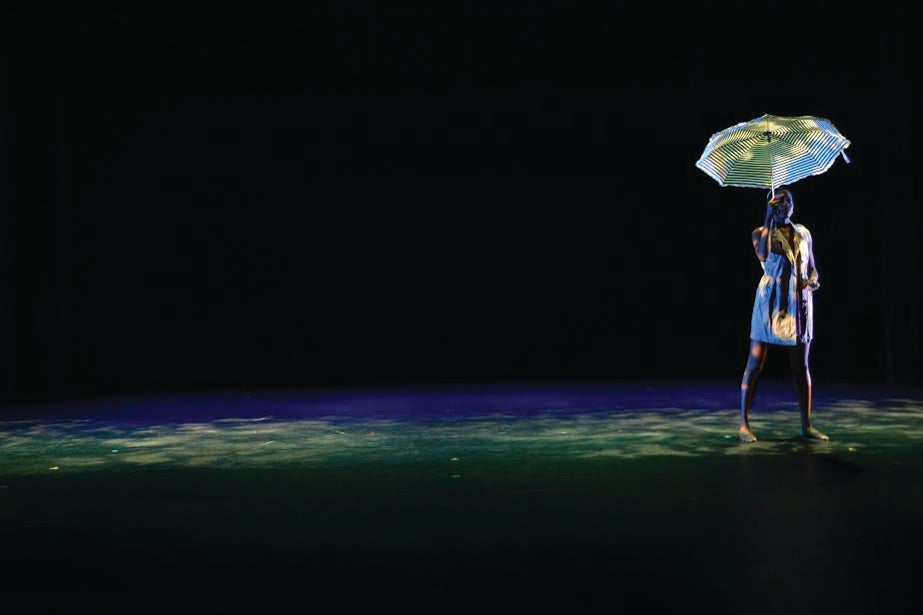
Prof. Raina Lucas, artistic director of the academic class and ensemble Georgetown University Dance Company helped students explore and discover ways dance can bring positivity, joy, and healing to a world suffering from the impacts of COVID-19. Students were introduced to many of the efforts made in the greater dance community to support one another and make dance more accessible virtually while practicing social distancing. Lucas notes that many students noted in discussions and written responses how important community is to the performing arts. “Through assigned virtual movement journals, some students found joy using Zoom to re-connect with each-other, their families, or with former dance friends from their home studios to learn new movements/techniques, work on ballet technique through my pre-recorded ballet barre classes, or learn fun and engaging choreography. Students also participated in a choreography unit which promoted reflections on the kinds of stories they hope to share through movement and how to run productive and empowering rehearsals for student choreography.
At the end of the semester, students gave insightful presentations which integrated dance into their other academic and career interests (something we would normally be unable to do in our regular environment and with a studio-focused schedule). There were many surprising discoveries on how dance shapes and is shaped by society. Some projects explored dance, privilege, and cultural identity. Others connected the popularity of dance with social media trends as well as how people danced historically in social settings and during trying times. Other projects focused on the importance of dance education and cognitive development as well as how dance can be used as a therapeutic tool.”
The last few weeks of the semester sparked new discussions and considerations on ways GUDC can collaborate with others virtually and in-person, make dance more accessible to GU, and how they can support the DC community. Lucas says, “We were very fortunate to all have the ability to connect ‘live’ with each other twice a week and explore together material that challenged our current understandings of dance in performance and in society.”
Acting I Class
WTOP NEWS radio (103.5 FM) featured a segment on how Prof. Sarah Marshall’s Acting I class (TPST 120) — which relied heavily on meeting in person — shifted to online learning.
